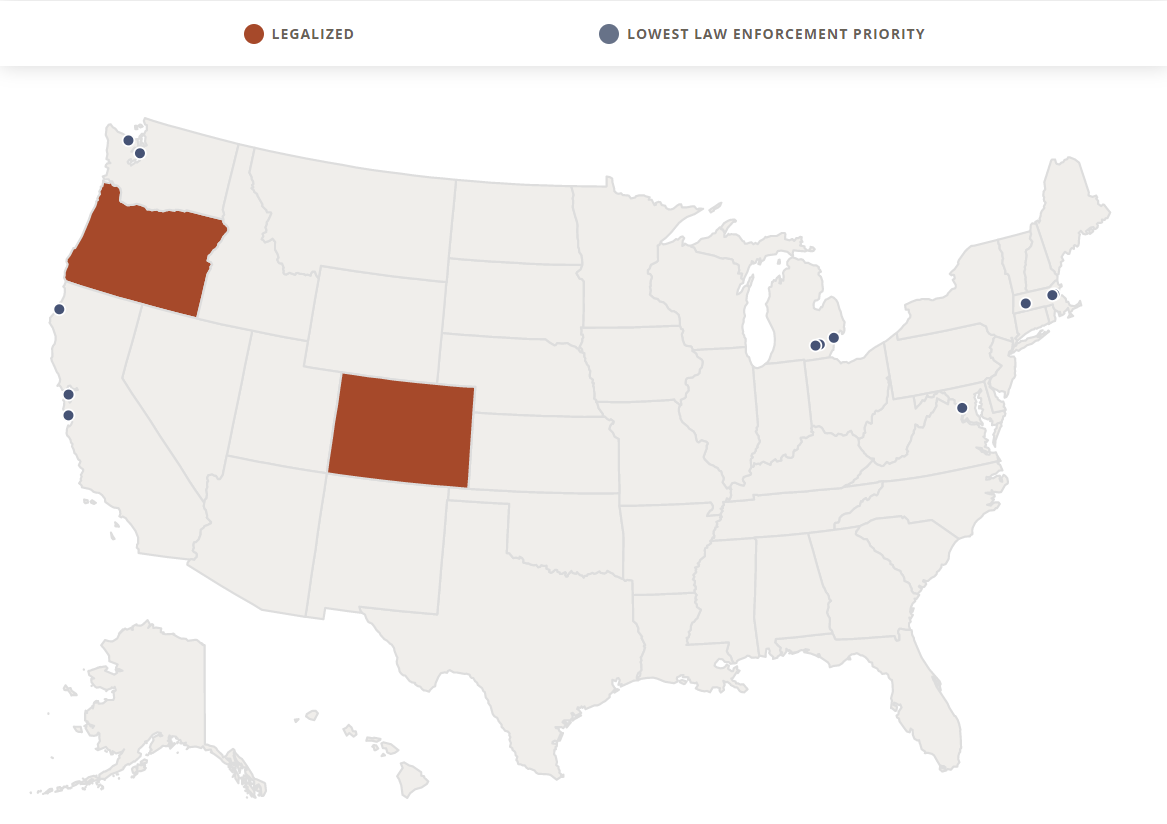It seems that the Oregon psilocybin program is off to a slow start. The Oregon Health Authority (OHA) did a good job meeting the Measure 109 rulemaking and development deadlines, including by opening the license application portal back on January 2. Still, a slew of factors, some of them structural, have tempered program launch.
The numbers
A few weeks back, on January 12, I did a panel presentation on the “Kickoff of Measure 109” with Jesse Sweet of OHA and Kaci Hohmann of Emerge Law Group. On request, Jesse provided the audience with OHA data on the amount of applications submitted in the first 10 days of licensing. Here is what he shared with the presentation audience:
- 4 manufacturer license applications; 73 incomplete
- 2 service center license applications; 24 incomplete
- 0 lab license applications; 5 incomplete
- 0 facilitator applications; 44 incomplete
- 82 worker permit applications
- 19 approved training programs
These numbers seem low for the first 10 days of this much anticipated program. And they appear to be increasing only gradually. OHA indicated via the Oregonian that as of this Monday, January 23, we had:
- 4 manufacturer license applications (no increase)
- 3 service center license applications (increase of 1)
- 1 lab license application (increase of 1)
- 0 facilitator license applications
- 92 worker permit applications (increase of 10)
- [unspecified] approved training programs
You can see that the “submitted” numbers aren’t moving much. As to “incomplete” applications, the Oregonian article did not relay statistics, but it’s important to understand that many of those submissions will never make it through. Some of them are from people like my paralegal, who created a login on January 2 to poke around the system and aid with client submissions. Other applications will fizzle out between submission and pay status: some people won’t submit basic forms, or pass inspections, or pay the (high) licensing fees once the time comes. At least, that’s how it has always been on the cannabis side.
View the US Map of Psilocybin Legality by State
The issues
We have always anticipated that the Oregon psilocybin program would be cumbersome. In the run-up to voting on Measure 109 (Psilocybin Services) and Measure 110 (Drug Decriminalization), I aired this critique of what Oregonians were about to consider. In salient part, I wrote:
If the sponsors of Measure 109 had been able to pull off something less cumbersome, we’d like to think they would have. We should not need an “Oregon Psilocybin Advisory Board” and a “Two Year Program Development Period” and “Licensed Facilitators” and a “Product Tracking System” and rulemaking and licensing and blah blah blah. Also, it should not be illegal to gather magic mushrooms in the woods or grow them in your closet! Adults should be able to possess small amounts of drugs and use them, recreationally or as medicine. For that reason, it would be great to see Measure 110 pass (“Drug Decriminalization and Addiction Treatment Initiative”), regardless of the fate of Measure 109.
Both Measures ultimately passed, of course. But under the services-based structure of Measure 109, costs are high for everyone, from licensed facilitators to clients. This means that it will be an expensive and challenging business proposition to run a service center. There are many unknowns, starting with how many people will be able to afford these costly services, and to what extent a recurring client base is possible. It’s my guess that two years from now you’ll have a few high-end retreats doing well, a handful of profitable service centers in urban areas, a bunch of struggling, smaller operators… and some spectacular flame-outs.
What are some discrete issues contributing to this challenging milieu? Here are my top five:
- The lack of a retail sales or an off-site use allowance, to supplement the on-site, supported adult use model
- The high cost of licensing for facilitators in particular (up to $8K for certification, plus $2K in OHA fees annually)
- The length of administration sessions, which can be six hours minimum at the highest doses (and not reimbursable by insurance)
- The decision by 137 towns and counties to opt out of psilocybin services
- Intractable issues caused by federal prohibition, especially around taxation and lack of banking
The takeaway
Oregon’s psilocybin program is beta. It’s also important, so let’s hope it gets on track without a crush of struggling operators and priced-out customers. Most likely, the legislature will dive in and mess around with things at some point, as they do with cannabis annually, and as they’ve already proposed with psilocybin this session. There will be many sets of changes to the OHA rules as well.
For now, I maintain the Oregon Psilocybin Services program will be fairly constrained, and small. Early application data certainly supports that view.
___________________________________________________________________________________________
For more on all things Oregon and psilocybin, including expansive coverage of OHA rules and program developments, check out our 50 post archive here. For information relevant to starting a psilocybin business in Oregon, check out these specific posts:
- Oregon Psilocybin: Business Issues
- Oregon Psilocybin: Banking
- Oregon Psilocybin: Real Estate, Insurance, and Employment Issues
- Oregon Psilocybin: Professional Service Providers
- Oregon Psilocybin: Trademarks & Patents
- Oregon Psilocybin and Securities: Raising Money Right
- Psilocybin Fundraising: Five Tips on Approaching Investors
- Psilocybin Companies and Phantom Income
- Psychedelics Benefit Companies
- Psilocybin Lease Checklist: Top 10
- Can Non-Oregon Residents Get Psilocybin Licenses?
- Starting a Psilocybin Business: Write it Down


























